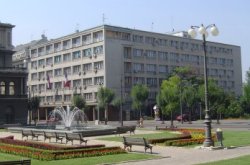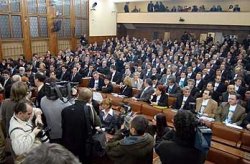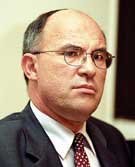How did the Parliament abolish the death penalty in Serbia in 2002?
Integral Record Debates concerning capital punishment
At the time of the final abolition, Serbia was a federal unit in the Federal Republic of Yugoslavia (FRY, 1992–2003) and not an independent state. The federal legislator had abolished capital punishment for federal crimes (primarily crimes against humanity) in 1992 and 1993, but the two federal units (Serbia and Montenegro) kept it in their laws for the aggravated forms of murder and robbery.
When the regime of Slobodan Milosevic was toppled (5 October 2000), the country’s integration into Europe, via its membership in the Council of Europe, became the first priority. A major requirement for the membership was a full abolition of the death penalty.
In consequence, on 25 October 2001, the Federal Parliament struck the provision permitting the federal units to apply capital punishment and increased the maximum prison sentence to 40 years, as a replacement for the death penalty. It was now for the two republics to follow the suit and strike the death penalty from their laws.
Serbia did this on 26 February 2002, by adopting the Act on the Amendments to the Penal Code. The abolition was but one of the many proposed amendments, but the Act was put to the vote as a whole. Therefore, the vote did not reflect fully the attitudes of individual parties and M.P.s towards capital punishment. Some, although opposed to the death penalty, voted against the proposed Act because they were unhappy about some other provision, and vice versa.
There were 250 seats in the Parliament. A two-thirds majority (176 seats) belonged to the Democratic Opposition of Serbia (DOS), a coalition of as many as eighteen political parties, led by Zoran Djindjic’s Democratic Party (DS) and Vojislav Kostunica’s Democratic Party of Serbia (DSS). The opposition parties were: Slobodan Milosevic’s Socialist Party of Serbia (SPS) with 37 seats, Vojislav Seselj’s Serbian Radical Party (SRS) with 23 seats, and the Party of Serbian Unity (SSJ), founded by the then late criminal and security service operative Zeljko Raznatovic Arkan, with 14 seats.
 &am;nbsp;
&am;nbsp; 
National Assembly of the Republic of Serbia (2002)
|

Vladan Bati�
|
It was clear to all that the paramount reason for the abolition was to ease the country’s admittance to the Council of Europe. As much was said explicitly by the then Minister of Justice Vladan Batic (DOS): „It [i.e. the abolition] is something that is characteristic of the contemporary or modern European law; it is a position of the Council of Europe, the European Union, the OSCE. In a word: there is no death penalty in Europe“. Batic himself was not against capital punishment. He was bound by his ministerial duties to propose the abolition, but he sympathized with those who felt differently: „Deep down, many of us are probably against the abolition, but I repeat that his is an achievement of the European civilization“.
Democratic Party M.P.s were consistent in their support for the abolition. They made use of more general arguments against the death penalty, beyond the European requirement, such as its lack of deterrent effect and the possibility of judicial error.

|
| Djordje Mamula |
Democratic Party of Serbia took a rather sceptical position. This was odd, as its Programme was explicitly against the death penalty and mentioned its abolition as one of the Party’s political goals. Nonetheless, when an abolition proposal was finally there to vote for, the DSS members disliked it being done for the sake of European integrations and chose to follow in the steps of Russia, where a moratorium on executions was in place, but the death penalty remained on the books. Their pro-Russian stance seemed to take precedence over their own political programme. A DSS member, lawyer Djordje Mamula, claimed dramatically (although incorrectly) that „under Mitterrand, in France the heads rolled off the guillotine“. He accepted the proposed amendments, but only with some dark forebodings: „This grafting of the solutions rom the European Union does not seem the best solution and, well, the bill to pay for this abolition of the death penalty may come sooner than we expect“. His colleague Petar Cvetkovic claimed (also incorrectly) that Europe was currently overwhelmed by „exceptionally heated discussions on whether the death penalty should be reinstated and whether [its abolition] had been the right move“. Therefore, it would be better for Serbia to take a leaf out of Russia’s book.
|

Miloš Nešovi�
|
Socialist Party of Serbia seemed rather contradictory. On the one hand, its deputies boasted of having partially abolished the death penalty when their party was in power in 1992/1993. On the other, they now opposed the abolition. „The conditions prevailing in our region today do not allow for an abolition of capital punishment“, said SPS’s Milos Nesovic. His colleague, Slobodan Tomovic, took a different view: he would support an abolition for the sake of Serbia’s membership in the Council of Europe, although this left him with a bitter aftertaste. Otherwise, he was sure that the majority shared his belief that „an abolition was probably the last thing we should be doing now“.
Serbian Unity Party was all in favour of keeping the death penalty. Its members were certain that the conditions for an abolition were not there. Were it to be abolished now, the Parliament would have to reintroduce it in the very next session, claimed SSJ’s Petar Popovic.
Serbian Radical Party was against capital punishment in principal. For more than a decade, its abolition has been enshrined in the SRS’ political programme. However, the Radicals chose not to take a part in the parliamentary debate on 26 February. Instead, they used the floor to obstruct the debate on the proposed amendments, by speaking solely about the alleged criminal activities of the Prime Minister Zoran Djindjic and the ruling coalition.
At the end of the day, the Act on the Amendments to the Penal Code of Serbia, including the amendment abolishing the death penalty, was adopted with 131 against 56 votes.
And that is how the Parliament abolished the death penalty in Serbia in 2002.